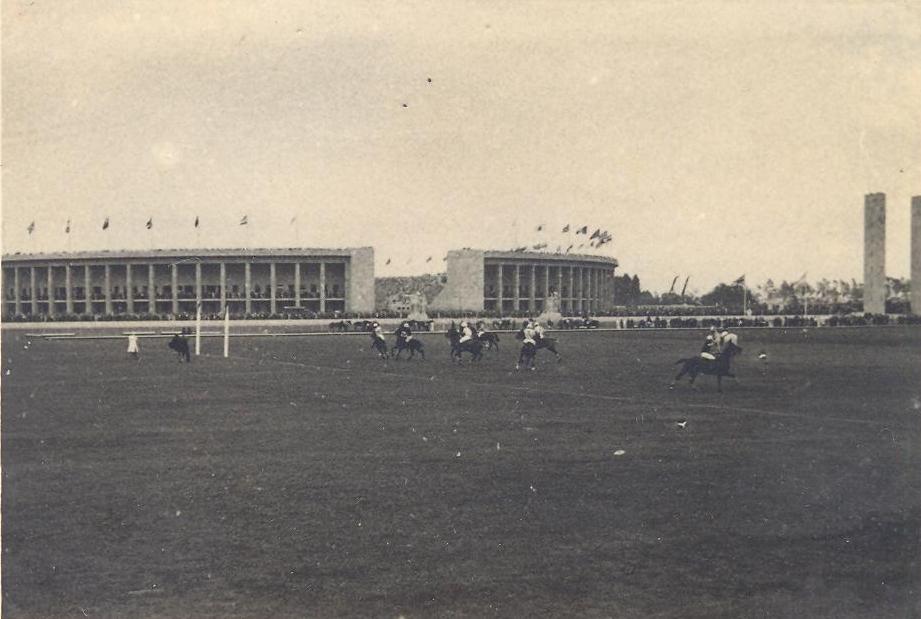Polo at the 1936 Summer Olympics on:
[Wikipedia]
[Google]
[Amazon]
International Olympic Committee medal database
shows only these players as medalists. They all played at least one match during the tournament. The reserve players are not listed as medalists.

Polo
Polo is a ball game played on horseback, a traditional field sport and one of the world's oldest known team sports. The game is played by two opposing teams with the objective of scoring using a long-handled wooden mallet to hit a small ha ...
returned to the Olympic program at the 1936 Summer Olympics
The 1936 Summer Olympics (German: ''Olympische Sommerspiele 1936''), officially known as the Games of the XI Olympiad (German: ''Spiele der XI. Olympiade'') and commonly known as Berlin 1936 or the Nazi Olympics, were an international multi-s ...
in Berlin
Berlin ( , ) is the capital and largest city of Germany by both area and population. Its 3.7 million inhabitants make it the European Union's most populous city, according to population within city limits. One of Germany's sixteen constitu ...
, after not being contested at the 1928 Games or 1932 Games. The 1936 tournament was the last time that the sport was contested at the Olympic Games. Argentina repeated as champions, winning gold medals in both of the Games in which the nation competed. Great Britain took silver; British polo players had earned medals in all five of the Olympic polo tournaments (including as members of mixed teams in 1900). Mexico took bronze, matching its previous performance in 1900.
Background
This was the fifth and final time that polo was played at the Olympics; the sport had previously appeared in 1900, 1908, 1920, and 1924. Each time, the tournament was for men only. For 72 years, polo had the distinction of being the last sport to be removed from the Olympic programme; baseball/softball took that position after the 2008 Games. Argentina and the United States were the top two polo-playing nations in the world. The 1924 Olympic tournament had come down to a 6–5 Argentine victory to determine the gold medal; the United States beat Argentina in 1928 and 1932 Cup de las Americas during years in which the sport was not contested at the Olympics. Earlier in 1936, however, Argentina had taken the Cup over the United States. The Americans did not send a team to Berlin, leaving Argentina the heavy favorites at the 1936 Games. Germany and Hungary each made their debut in polo in 1936. Great Britain made its fifth appearance; it was the only nation to compete in all five editions of the Olympic polo tournament. Argentina and Mexico each made their second appearance.Competition format
The tournament used an ad hoc format deliberately designed to create a final between the recognized strongest teams in the tournament, Argentina and Great Britain. The hosts, as well as Hungary, were not even given an opportunity to contend for the gold medal, with the teams separated into divisions.Official Report, p. 1088. The first three matches were set to pit Mexico against first Great Britain and then Argentina in the top division, and Germany against Hungary in the lower division. If, as expected, Mexico lost both games, the match between Great Britain and Argentina would be the gold medal final. The winner between Germany and Hungary would play Mexico for the bronze medal.Medalists
Note: ThInternational Olympic Committee medal database
shows only these players as medalists. They all played at least one match during the tournament. The reserve players are not listed as medalists.
Participating nations
Each country was allowed to enter one team of 8 players and they all were eligible for participation. A total of 21''(*)'' polo players from 5 nations competed at the Berlin Games: * * * * * ''(*) NOTE: Only players who participated in at least one game are counted.'' Only a few reserve players are known. The organizers also invited United States and India, but those nations declined to send teams.
Results
; Group A ; Group B ; Bronze medal match ; FinalSummary
References
* {{Polo at the Summer Olympics 1936 Summer Olympics events1936
Events
January–February
* January 20 – George V of the United Kingdom and the British Dominions and Emperor of India, dies at his Sandringham Estate. The Prince of Wales succeeds to the throne of the United Kingdom as King E ...
1936 in polo
Men's events at the 1936 Summer Olympics